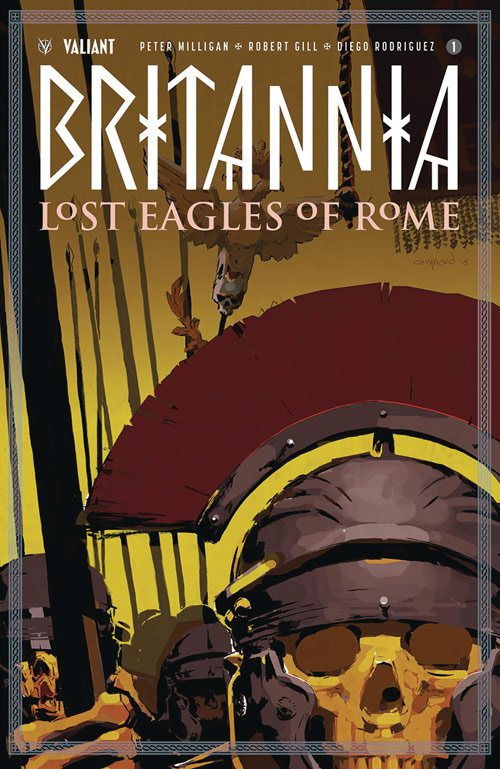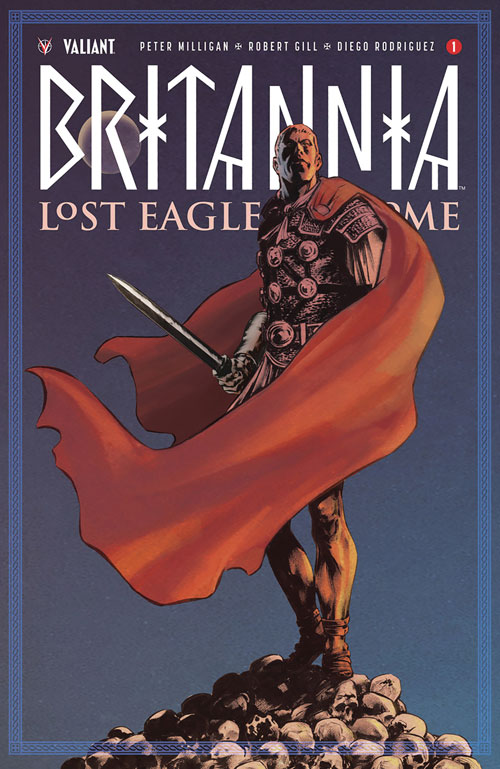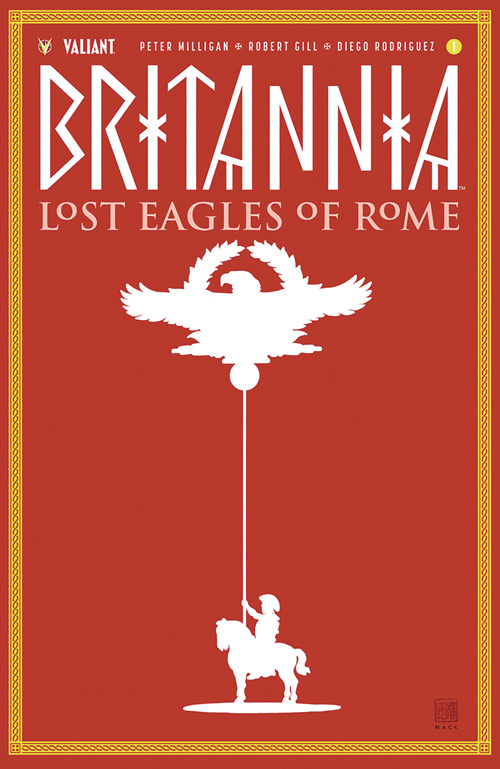Mind, Monsters, And Magic In Peter Milligan’s Britannia
Jul 17, 2018
 |
by Vince Brusio
It’s not often you’ll find a detective story in which the protagonist practices his craft in an age before gas lamps. Yet writer Peter Milligan steps up to the task, and makes it murderous monstrous fun with the Britannia: Lost Eagles of Rome mini-series by Valiant Entertainment. In this PREVIEWSworld Exclusive interview, Milligan mulls over how he moved his man through a time and age when logic was typically lost in longstanding tributes to gods that were granite.
Britannia: Lost Eagles of Rome (MAY182072) is in shops July 25.
**********
Vince Brusio: Britannia: Lost Eagles of Rome (MAY182072) is said to be a “jumping-on point” for readers, which can be a good thing because this title has been coming out from Valiant for a couple of years now. So tell us how this installment brings readers up to speed?
Peter Milligan: In a sense, every new story involving Antonius Axia – the “detectioner” – could be said to be a decent jumping-on point because they all involve a discrete case, which our detectioner has to try to solve. In Lost Eagles Of Rome, we meet all the main characters from the previous storylines: Axia himself; his slave, Bran; the clever and possibly Machiavellian leader of the Vestal Virgins, Rubria; the mad and definitely Machiavellian Emperor Nero; and also, a character whom we introduced in the last storyline, the female gladiator, Achillia. So, we can jump straight into this story and understand the dynamics between these main players pretty quickly. Obviously, a reader might get more depth and an even deeper understanding of the characters if they’ve read the previous stories but that’s not necessary to understand and be gripped by this latest storyline.
Vince Brusio: Antonius Axia, the book’s main character, is fingered as being the world’s first detective. It’s really a fascinating premise. To set someone up as the precursor to Sherlock Holmes. How did you play with that notion before sitting down and trying to find the voice and rationale of the character?
Peter Milligan: What I was interested in was the way that Antonius thinks. Britannia is predicated on the idea that most if not all people in this age looked to the gods for an understanding of the world. Prayer, ritual, and sacrifice was central to these people’s lives and to how they saw the world and what went on in the world. It was very orderly in what feels like a very Roman way. If the gods were correctly served then there was a fair chance that those gods would reciprocate. “Do ut des,” as they said: “I give that you might give back.” So, what’s interesting is that though we seem to be able to understand what the Romans were about – all that building, all that warfare and empire building feels quite modern – on a deeper level, on the way they thought and interacted with the world, they were very different.
Enter Antonius Axia. Due to some strange rituals and extensive reading that the Vestal Virgins put him through after his mind was blown in a weird incident in a cave in Tuscany (as related in the first Britannia storyline), Antonius has been rebuilt, remodeled, and he now thinks very differently from his contemporaries. He thinks more like us. He looks for cause and effect, he looks for psychological motivation instead of immediately turning to some god or other and looking for an answer there. So, from these thoughts came the idea of the detectioner, the first detective, and from there I got the kind of his voice and character I wanted (analytical, skeptical) but I didn’t want him to be some purely cerebral creature like Holmes. Antonius is both tougher and weaker than that – as an ex-soldier he can look after himself in a fight; as a man, with a heart, he’s perfectly capable of making a fool out of himself with a woman.
Vince Brusio: Monsters, magic, and conspiracy dance on the edge of sanity for this series. Having such an extensive career in comics, such topography must have been an intoxicating playground for you when you first had to survey it. What did you focus on first?
Peter Milligan: For sure, the possibilities are seemingly endless. But what I like about all that strange and weird stuff, what’s it’s actual purpose in this story is, is how it acts as a kind of counterweight to Antonius’ logical, rational thinking. In Britannia I always like to have a kind of tension between the logical and the fantastical. In some way, this must be a tension that exists inside Antonius himself. For though on the surface he’s this detective trying to understand things through a logical process of observation and analysis, his whole life up to the point of his rebuilding by the Vestal Virgins and the society in which he was raised and in which he continues to live is one that’s very crowded with gods, demons, and magical thinking. All this must continually bubble just beneath the surface of Antonius, just as it bubbles just beneath the surface, usually – but not always – just out sign of the comic.
As for conspiracy, well, Ancient Rome was awash with the stuff, which is great for a writer.
Vince Brusio: We not only seem to have the world’s first detective in play, but the template for Roger and Riggs from Lethal Weapon, as Antonius Axia (a thinker) has to pal around with Achillia (a sword-wielding arena champion). Mind and muscle hand-in-hand to satisfy the state. So what’s the banter like between these two? How much fun was it to have them regard each other as partners?
Peter Milligan: I have to say, Roger and Riggs certainly weren’t at the forefront of my mind when I created this pairing! Maybe bringing it all down to Brains vs. Muscle is a bit reductive. In fact, though he uses his brains, Antonius is tough and handy with the sword. And though she’s a formidable fighter, Achillia is no idiot. She does, though, believe in the gods – as most people did – and the tension between the way she and Antonius think about the world is central to the story and to the fun I can have with their interactions.
This fun and this tension extends to other important characters in the Book: Nero and Rubria. They often clash and each represent two different kinds of power. Nero is obviously temporal power, he has the army, the physical power. But Rubria has what you might call “soft power.” As a Vestal Virgin she’s privy to information, she has a spiritual kind of power, the people are mostly in awe of her, which means that Nero and Rubria just about balance each other out. We sense that if he could, Nero would do terrible things to Rubria. But he doesn’t quite have the nerve to – at least until he finds a good enough excuse.
Vince Brusio: As this book is rooted in history that precedes a time before anyone on this green Earth today was even alive, how did that fact figure into your story pre-production? What did you read to brush-up on this era? How did you put yourself on the streets of ancient Rome?
Peter Milligan: I’ve read quite a lot. Some of it famous: Robert Graves’ I, Claudius series. Works by the brilliant Mary Beard and even fiction by Yourcenar and the meditations of Marcus Aurelius, plus other lesser-known stuff, about Romans in Britain, about the lives of everyday Ancient Romans. All this is important and I wanted to do my best to get a grip on what life was like but at the end you then have to use your imagination. The creative impulse has to take over. I have stretched historical fact here and there where it’s necessary but I think I’ve kept the spirit of the truth. For example, to bring us back to and end on the Lost Eagles of Rome, the eponymous eagles of the title refer to the Roman standards – or eagles – that the legions would carry into battle and which came to have a profound significance, a symbol of Roman power. The idea of the lost eagles came from a famous battle which the Romans lost at the Battle of Teutoburg Forest. Several eagles were lost that day, and this had a huge impact on the emperor of the day, Augustus, who was said to wander the corridors of his palace wailing, “Bring me back my eagles!”
I’ve moved that military disaster to the time of Nero, the time of our story. So, not historical fact. But Britannia is – mostly – fiction.
 |
 |
**********
Vince Brusio writes about comics, and writes comics. He is the long-serving Editor of PREVIEWSworld.com, the creator of PUSSYCATS, and encourages everyone to keep the faith...and keep reading comics.




